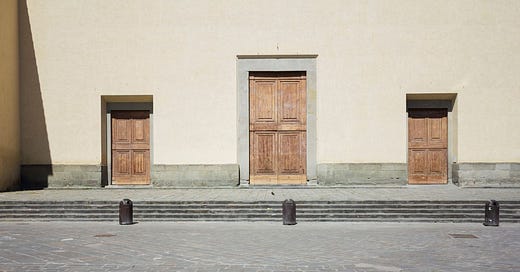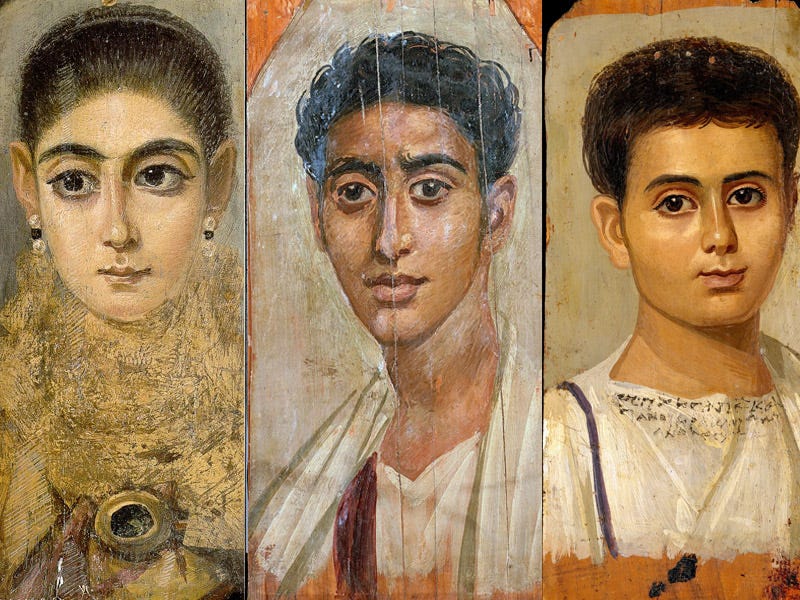First: a quick note on a local Florentine issue. The government here recently announced that between 21.00 and 06.00, every Thursday to Sunday, hanging about in public spaces without a receipt from a local bar or restaurant will be forbidden. The decision was taken in response to the actions of a group of young people who “stormed” the steps of the church of Santo Spirito, a popular nightlife spot, to protest against concrete bollards that had been put in place to cordon the space off. Obviously, with the delta variant circulating, there is still a need to contain mass gatherings. The council’s interventions, though, are surely indefensible. One could make a case for quotas. Instead, they have effectively designated the entire city centre - from Santa Croce to Ognisanti - a space of mandatory consumption; where it’s totally fine to sit cheek by jowl in an overpriced cocktail bar, but where it’s no longer OK to walk a dog, or play with your kids, or smoke a cigarette on a bench. Thankfully, this rule is totally unenforceable (and one receipt, of course, can go a long way). Nevertheless, it’s a poor decision by the local administration, and if you live here it’s probably worth signing the petition to oppose the measure. If only as a matter of principle.
Will they bend the knee? There’s been a fair bit of entirely avoidable controversy this past week regarding the Italian football team and their seeming reluctance to do so at the ongoing European Championship. The gesture, which is associated with the Black Lives Matter movement, is a form of recognition that a) systemic racism exists everywhere and b) it needs to be tackled seriously. Several teams in the competition have performed the gesture as a means of drawing attention to discrimination in the world of football and in society as a whole. Italy have wavered back and forth. Some players have bent the knee, some haven’t. Now, the Italian Football Federation (FIGC) is calling for unity. They expressly ordered the team not to do so in the match against Austria. Ahead of tomorrow’s game, however, they’ve changed their tune, stating that players may indeed make such a gesture, “not in support of the Black Lives Matter campaign”, but “as a sign of solidarity if their next opponents Belgium choose to do so.” I mean, who came up with that one? This is a move that succeeds in pleasing nobody and offending just about everyone (and it’s a good reminder too of how vital podcasts like Sulla Razza [Italian only] remain in educating the public about these issues).
On the subject of race - or, more accurately, the colonial lens through which we imagine it - I was pleased to publish a long read last week over at Aeon magazine about how, over many decades, white supremacists have deliberately misread ancient history in order to produce anachronistic precedents for their ideology. I wrote the essay over the winter as a response to the Capitol riots in the United States, in order to give some background context to the postmodern (mis)appropriation of Roman Imperial symbols. During the edits, though, the piece grew into a more expansive interrogation of the paradoxes that underpin the apparently neutral term: ‘western civilisation.’ Mine is a relatively small contribution to what is - obviously - a vast topic, though hopefully it helps shine some new light on the fundamentals. For more detail, I recommend Olivette Otele’s excellent African Europeans: An Untold History which was one of the key references in my research.
Arts and culture: La Vita è Dolce
For a week or so each year, towards the end of June, fireflies descend on the Italian hillsides, congregating in dark forested areas where they buzz about and illuminate the undergrowth. Sadly, these phosphorescent little critters are now endangered. It’s actually a long story. Decades ago the poet and filmmaker Pier Paolo Pasolini lamented that: “at the beginning of the sixties, the fireflies began to disappear in our nation, due to pollution of the air, and the azure rivers and limpid canals.” For Pasolini, the bugs were a metaphor; “a poignant recollection” that “a man of that lost era cannot be young among the young of today.” Well, thankfully, where I live, the bugs continue to struggle on, and it’s an enormous privilege to watch them dance their dance each year. What else is there to say? One can only hope that Pasolini was wrong, that the necessary environmental policies will be put in place so that future generations may also be able to bask in the oneiric spectacle.

My spirits were bolstered the other day when, returning from the coast, I found a copy of Letitia Clark’s new book La Vita è Dolce waiting for me on the doorstep. I’ve covered Clark’s work before. Her book on Sardinian food, Bitter Honey, was one of my highlights of 2020 and, as I wrote for Italy magazine at the time, the malloreddus and fregola dishes played no small part in my surviving the lockdowns in more or less one piece. Well, aside from her pasta skills, Clark also happens to be a brilliant, professionally trained pastry chef and her deserts are interstellar. This new release gathers together her “Italian-inspired” treats, and it showcases these talents to the full. Her approach is “traditional with a twist”; starting from cucina povera basics but augmenting the classic dishes with inspiration from France and Britain. Think ‘Chocolate & mascarpone tart with blackberries & sage’ or ‘Roasted almond panna cotta with poached apricots’ and you’ll get the idea. You can buy the book, and Bitter Honey, from Hardy Grant here.
Recipe of the week: cold white bean and yellow pepper soup
Italians don’t really do gazpacho. I mean there’s a chilled green bean minestra from Sanremo, and a few adjacent dishes like the Tuscan pappa al pomodoro, but such fare isn’t exactly a major part of the cuisine. With temperatures hitting 37 degrees here this week, though, there was no choice but to get something ice-cold on the table. I went for a tried and tested ‘Italian-inspired’ dish from Epicurious which is by-now a summer staple. It’s simple: roasted or barbecued charred (yellow) peppers are blitzed with white beans and then lifted with some chili, peppery rocket and a twist of lemon. It’s ridiculously healthy, with just a spoonful of oil, but still filling enough and - most importantly - it actually tastes great.
That’s it for this week - as ever I do hope you enjoyed this instalment. If you haven’t already, please do follow the ‘Week in Italy’ Facebook page, or my twitter, for a few extra links and easy-access to the substack archive. If this email was forwarded to you, or you’re accessing on the web and would like to receive further updates, you can subscribe using this link below. Thanks!
About Me
My name is Jamie Mackay (@JacMackay) and I’m an author, editor and translator based in Florence. I’ve been writing about Italy for a decade for international media including The Guardian, The Economist, Frieze, and Art Review. I launched ‘The Week in Italy’ to share a more direct and regular overview of the debates and dilemmas, innovations and crises that sometimes pass under the radar of our overcrowded news feeds.
If you enjoyed this newsletter I hope down the line you’ll consider becoming a supporter for EUR 5.00 per month (the price of a weekly catch-up over an espresso). I’ll be launching a paid subscription option later this year, to help fund some more in-depth writing and some original graphics too. More on that, though, once the pandemic subsides. In the meantime, please do consider forwarding this to a friend or two. It’s a big help.





